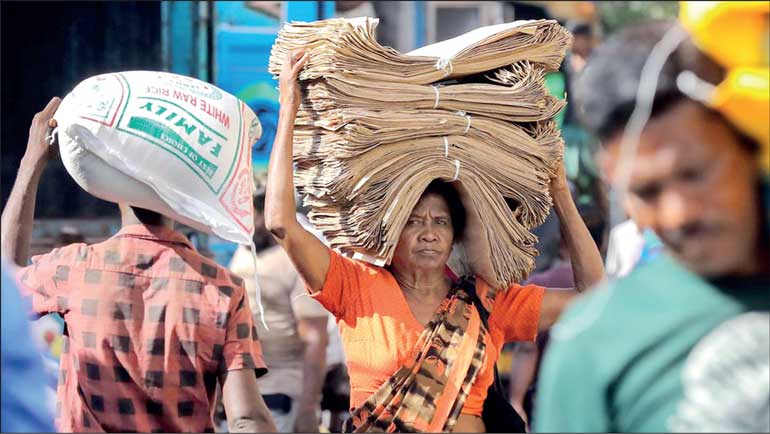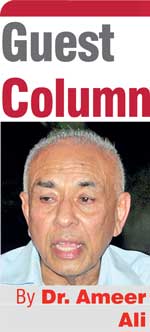Saturday Feb 14, 2026
Saturday Feb 14, 2026
Wednesday, 24 April 2024 00:20 - - {{hitsCtrl.values.hits}}

When Governments borrow, they actually mortgage the livelihood of citizens as collateral
 Debt negotiations between Government’s hired experts and private sovereign bond holders are reported to be progressing under closed doors and to the satisfaction of the principal supervisor IMF. This has convinced the former SLBC Governor Indrajit Coomaraswamy to feel confident that the third tranche of IMF’s $ 3 billion EFF would be released soon.
Debt negotiations between Government’s hired experts and private sovereign bond holders are reported to be progressing under closed doors and to the satisfaction of the principal supervisor IMF. This has convinced the former SLBC Governor Indrajit Coomaraswamy to feel confident that the third tranche of IMF’s $ 3 billion EFF would be released soon.
If settlement arrangements are to be finalised and signed by both parties the terms and conditions so agreed must be honoured by all future Governments until the entire debt is settled completely. The expectation is that the current debt burden would continue until 2040. But given the poly-crisis that Sri Lanka is confronting further borrowings cannot be ruled out. In fact, it is already borrowing. Therefore, all that the expected settlement would achieve is to make it easier for future Governments to borrow from international creditors. In other words, Sri Lanka would not be shut out from the credit market.
But the biggest question is whether the country could ever be debt-free with a socio-economic and political system that demands no accountability from its managers. True, lending and borrowing are unavoidable transactions in modern economies. However, when Governments borrow without limits and spend on injudicious projects, absent from any independent cost-benefit scrutiny, the real cost of project failures fall entirely on the shoulders of citizenry.
In other words, when Governments borrow, they actually mortgage the livelihood of citizens as collateral. Today’s economic suffering and destitution endured by a large segment of Sri Lankans is the true price for allowing this rotten practice and its supporting system to continue for decades. Irrespective of whether the current debt negotiations end in success or failure nothing is going to change as longs as the ruling system is allowed to continue.
System change is therefore the most basic need of Sri Lanka today. But sadly, IMF has no concern about this need and Ranil Wickremesinghe’s promise to empower peoples’ basic needs is only a political stunt devoid of any substance. While IMF is guarding the international financial system RW is guarding the socio-economic and political system at home. Both need change and the cry for that change is growing louder by the day.
It has been said before and worth repeating again that neither the IMF nor RW who claims credit for inviting the IMF to rebuild a bankrupt economy is interested in changing the systems they both represent respectively. IMF is one of the watchdogs created after World War II to take care of those economies that faced the danger of falling out of the capitalist train because of persistent budget crises. But, since the dawn of the era of financialisation of economies the primary objective of IMF has turned out to be protecting the financial architecture of turbo-capitalism. It is a continuing and shocking saga in modern economic history that in several developing countries their economic crises originated from financial crises in the developed world.
How could economists rationalise the bizarre situation where the financial sector created originally to serve the needs of the real economy becoming the leading sector and subjugating the real economy to serve the needs of finance? Accordingly, whenever a country in chronic balance of payments and budgetary difficulties approaches IMF for help that institution starts its assistance by prioritising the needs of the financial sector and not those of the real sector. Private institutional creditors are part and parcel of the global financial network. Hence, while tutoring Sri Lanka on how to repair the economic damage, IMF has not lost sight of the interests of the country’s private creditors. This is why although IMF is generally satisfied with Sri Lanka’s debt negotiations, no one knows yet what the final terms and conditions are going to be laid out by the creditors. This is also why the opposition is calling for greater transparency in these negotiations.
Another related aspect of debt settlement is Sri Lanka’s decision to divest its lossmaking state-owned enterprises (SOEs). IMF’s insistence on economic restructuring demands divestiture of these white elephants. Once again, it is the system in vogue that allowed inefficiency to creep into SOEs in the first place and made them lossmaking entities. Political interference, corruption and nepotism were endemic to these enterprises and even to sell them now is becoming difficult because there are no buyers. Will there be a fire sale to get rid of them? IMF’s demand for economic restructuring and reduction in social spending would invariably mean promotion of private enterprises and death of the welfare state. This would widen the class binary in this country with fast disappearance of the middle strata.
 All this are part of a grand scheme to convert Sri Lanka into a paradise for foreign investors. RW has already advertised that by 2048 Sri Lanka would be an industrial paradise glowing with export-oriented manufactures run on renewable energy and advanced technology. How many Sri Lankans would be employed in these labour-saving industries and at what rate of wages are details too uncomfortable for him to spell out before his re-election. However, encouraged by a couple of positive but not solid developments in the economic front, like reduced inflation and appreciating rupee, he has tempted foreign investors to get ready to capitalise on the next growth wave in this country. One wonders whether he is aware of the gloomy predictions about global economic outlook by IMF as well as other independent observers.
All this are part of a grand scheme to convert Sri Lanka into a paradise for foreign investors. RW has already advertised that by 2048 Sri Lanka would be an industrial paradise glowing with export-oriented manufactures run on renewable energy and advanced technology. How many Sri Lankans would be employed in these labour-saving industries and at what rate of wages are details too uncomfortable for him to spell out before his re-election. However, encouraged by a couple of positive but not solid developments in the economic front, like reduced inflation and appreciating rupee, he has tempted foreign investors to get ready to capitalise on the next growth wave in this country. One wonders whether he is aware of the gloomy predictions about global economic outlook by IMF as well as other independent observers.
To those who are familiar with development economics it is worth reminding the once popular Lewis-Ranis growth model advocating that labour surplus economies should promote labour intensive industries in the urban sector to remove disguised unemployment in the rural sector. That advocacy soon led to the idea of appropriate technology and China came out with its two-wheel tractor to start with. But on the whole what that model achieved was to convert disguised unemployment in the rural sector into open unemployment in the urban sector because the industries that developed were labour saving and capital intensive. Sri Lanka is still a labour surplus economy and its rural sector is that economy’s backbone.
RW’s export oriented industrial Valhalla cannot and will not be a solution to Sri Lanka’s unemployment issue let alone the poly-crisis. Blind adoption of advanced technology could spell disaster, and one doesn’t have to be a Luddite to warn policymakers of the negative side of high-tech-based industrialisation. Labour exodus to foreign countries speaks volumes about the enormity of employment problem facing this country. Surprisingly, the lure of foreign remittance is encouraging the Government to encourage this exodus. Instead of exporting material products the economy is forced to export human cargo.
What is IMF’s agenda for developing the rural sector? RW’s 2 million title deeds to farmers as announced in his Budget speech is more a political trick to win rural votes rather than a feasible solution to problems confronting this sector. Farmers certainly need titles of ownership to the land they till. But the prevailing socio-political culture will not allow that to happen. Beyond that the rural sector requires massive transfer of resources to enable it to produce surplus. But IMF expects the financial sector to drive growth in the real economy including the rural sector. This is an indirect approach insufficient to rejuvenate the largest segment of the economy that demands direct assistance.
It is surprising that one or two economists occupying opposition seats in the Parliament are also advocating modern technology as the ultimate solution to the country’s farming problem. It is dangerous to put all eggs in the single basket of technology. Farmers everywhere are the most conservative segment in a society, and unless they see proven success of a new experiment or innovation, they would be its most reluctant imitators.
In the meantime, IMF’s sector biased and class biased reforms and RW’s progressive cuts to social spending supplemented by his aswesuma poor relief had created near destitution and discontent amongst the masses. Families are skipping meals because of unaffordability. Unless there is radical change in the overall system that governs this country all reforms would remain patchwork attempts. Of all the political parties only NPP seems to have understood this dilemma, thanks to the aragalaya youth. NPP is calling for system change through social revolution. This is why the forthcoming election promises to be a contest between two generations of voters, one demanding system change and another desiring the status quo to continue.
The change demanders seem to be having the number to tip the balance. But the old guards are not going to surrender without a fight and they are resorting to the same old divisive and communal tactics to stop radicalisation of voters. NPP’s challenge is formidable but not unsurmountable. If destitution and discontent worsen in the meantime an open revolt from the masses cannot be dismissed.
“In the disturbances caused by scarcity of food, the mob goes in search of bread, and the means it employs is generally to wreck the bakeries” (Ortega Y Gasset, The Revolt of the Masses, 1957, p.60).
(The writer is attached to Business School, Murdoch University, W. Australia.)